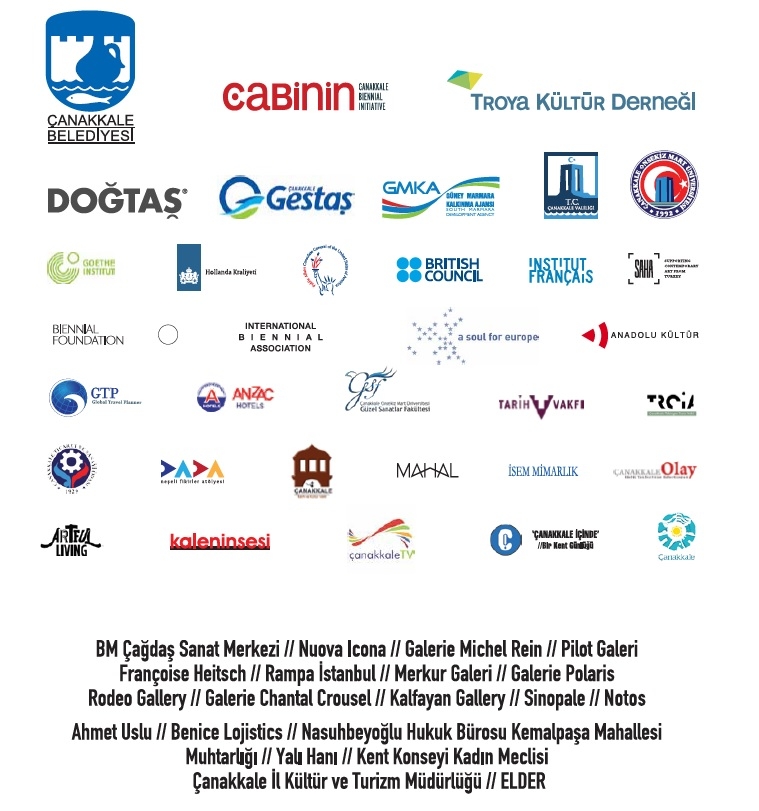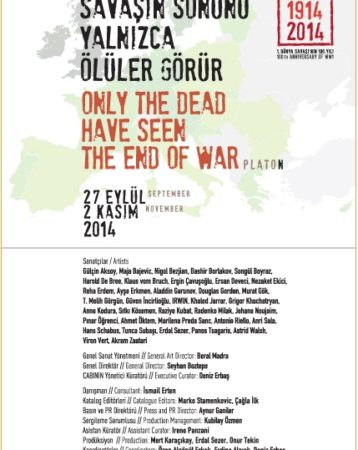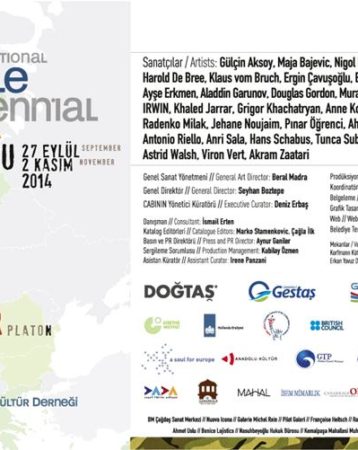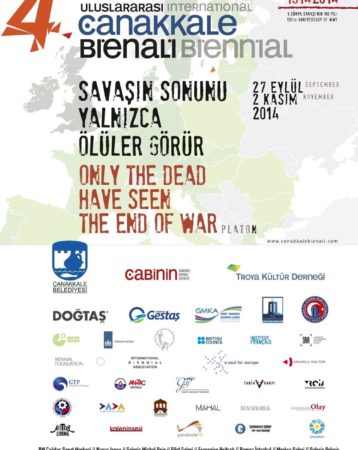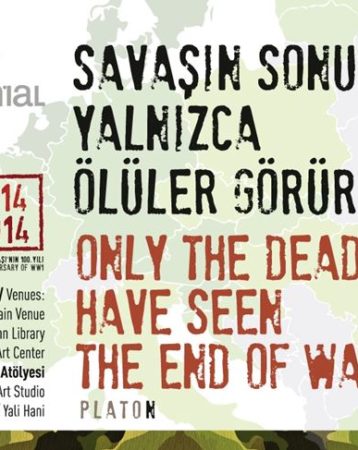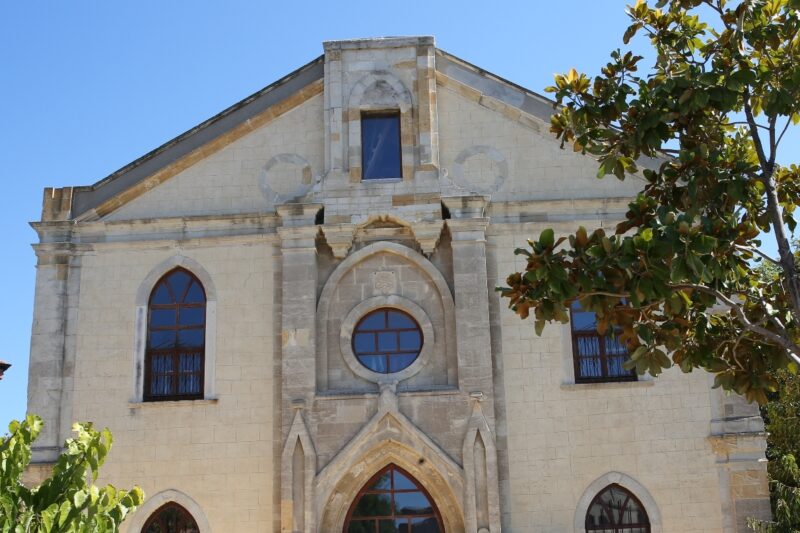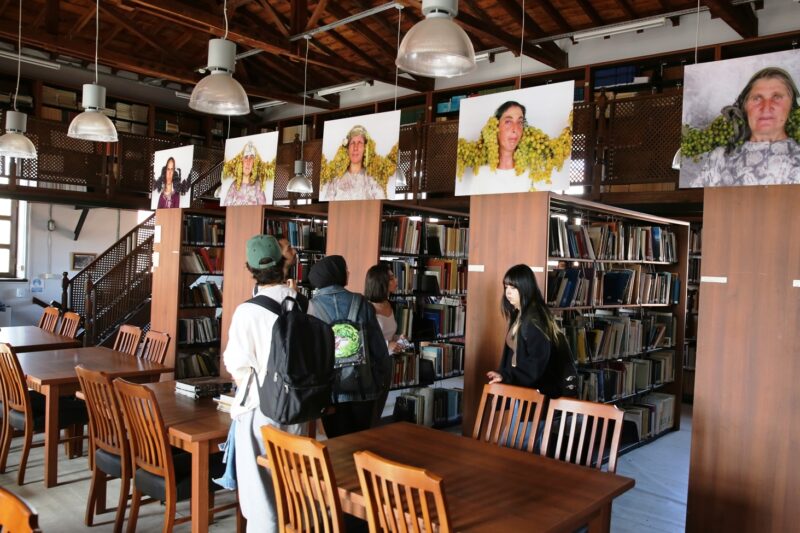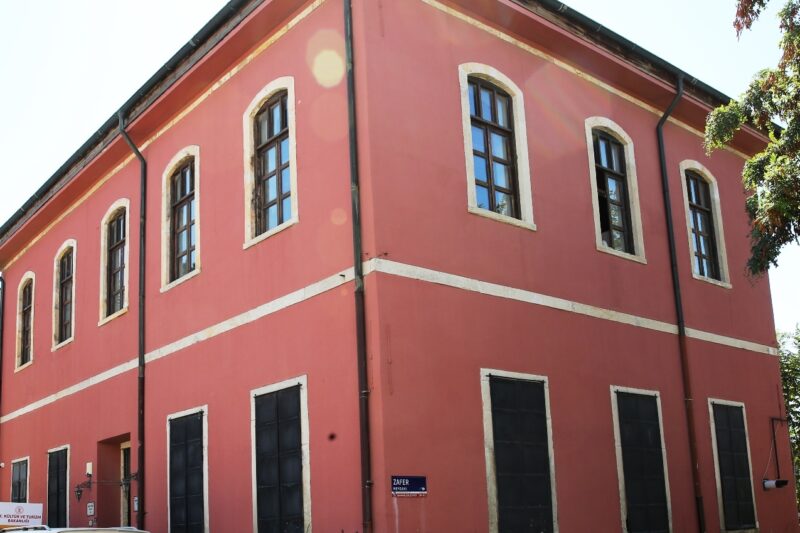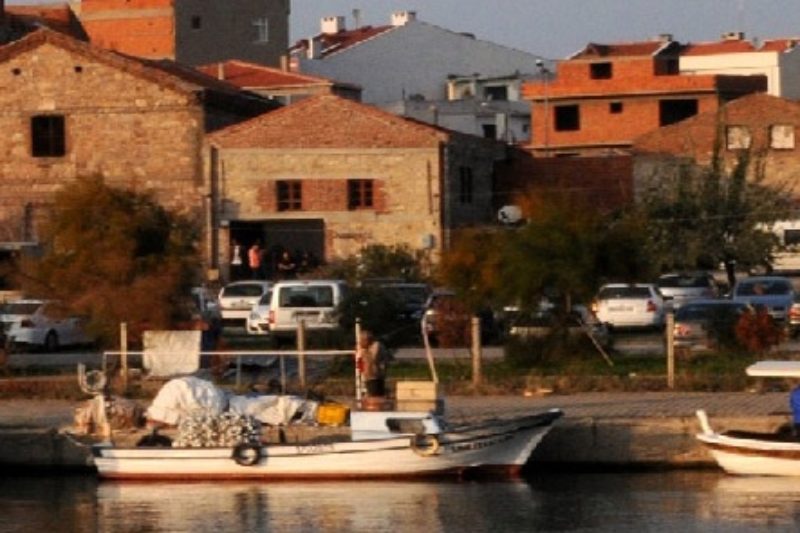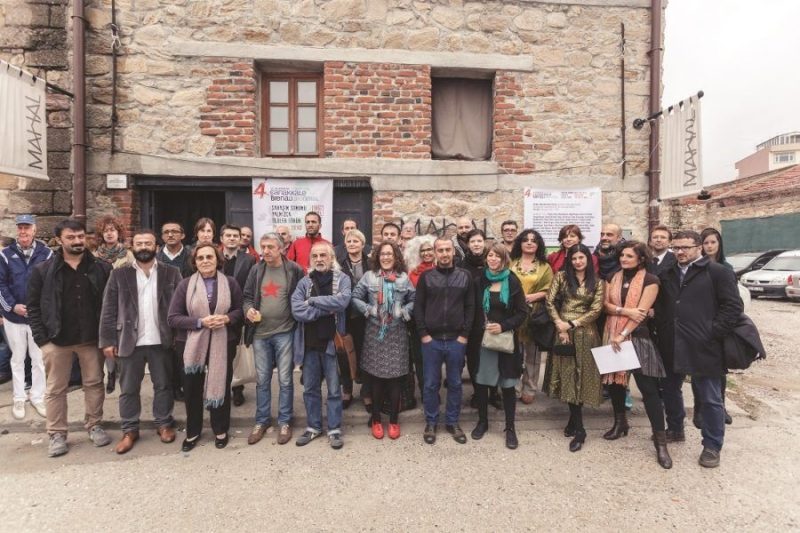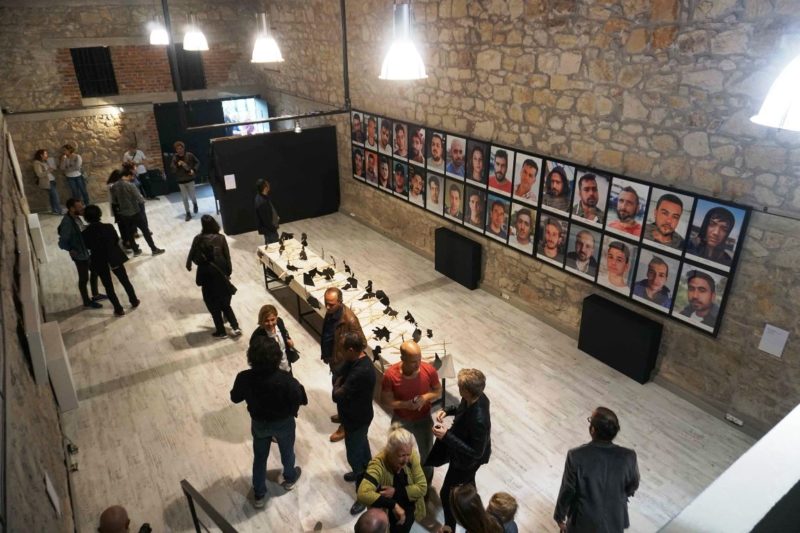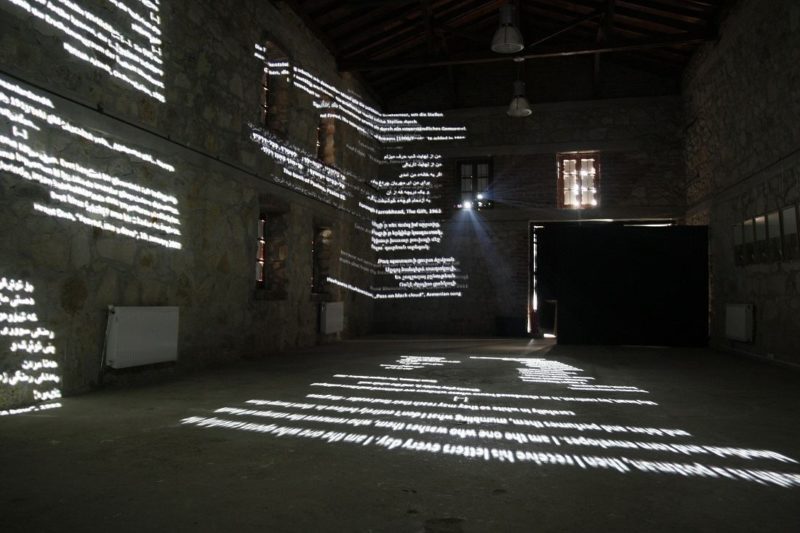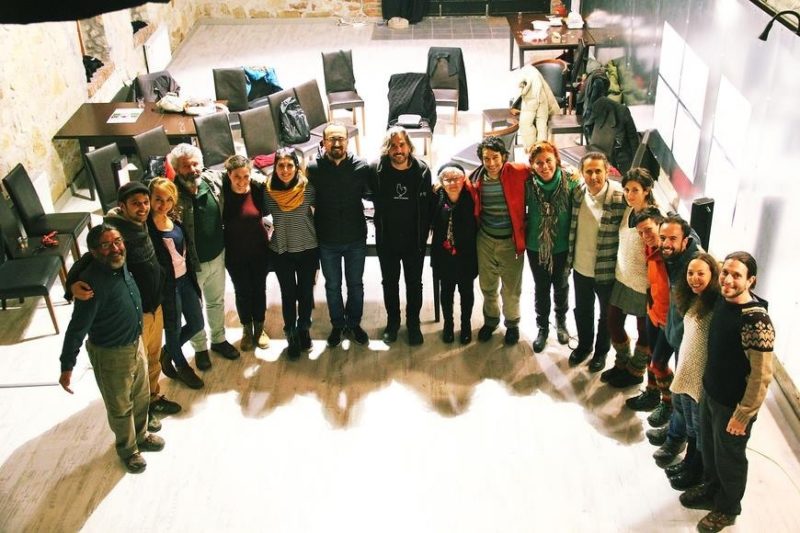International Çanakkale Biennial, since its foundation in 2006, has been aiming primarily to establish an international centre for contemporary arts and culture, and hence, to transform Çanakkale into a meeting point for production, observation and presentation of creations of contemporary art where Mediterranean, European and Middle-Eastern cultures intersect; then by inviting numerous artists and experts, to locate the city into the international network of communications, arts and culture of global biennial community; and finally, to provide an open platform for professionals, artists and institutions to exchange their practices and share expertise in collaboration.
The arguments, interpretations and critics so far elaborated in considering the 100th year of First World War constructed a constructively comprehensive conceptual framework for Çanakkale Biennial. In the centenary of 2014, numerous projects and events were held in those countries, which have participated in or affected by the war. Çanakkale Biennial anticipated a broad and effective participation in cultural and artistic topics of this global communication.
Perceiving artistic and cultural creations as the most effective means of reflection and criticism since the beginning of 20th century, Çanakkale Biennial this year, aimed at evaluating, elaborating and elucidating the ongoing political, social and cultural events and the impacts of war thereupon since 1914. Recognizing the fact that the city of Çanakkale, with its historical, cultural and natural context considerably affected by First World War and its aftermaths, having played a considerable role at the turn of our century, the relevant countries through their diplomatic representatives and cultural centres have not spared their contribution to the biennial.
The 4th International Çanakkale Biennial provided open communication and a collaboration platform for the international community and enables a comprehensive revaluation of the impacts of First World War and the 20th century at local, national and international levels on today’s political configuration and the historical geography of the Ottoman Empire as well. The biennial has invited those artists and experts who are most prominent with their specific works of art interpreting the consequences of war and peace cycles and the following political, economic, social and cultural consequences in Europe, the Balkans, the Caucasia and in the Middle-East. The sensitivity, anticipation and subtlety within their works are not only focused on the conditions in their own countries, but also on the effects on other countries and societies as well.
Altogether, they accomplished an accurate body of a common visual memory and a valuable accumulation of images. We believe the presentation of those works has created a substantial and stimulating effect on the intellectual capacity of the younger generations. As for the facilities, the Doğtaş building in the city centre has served as the main location for the 4th International Çanakkale Biennial. As previously, the Biennial used also the special buildings and venues of historical importance like Korfmann Library, old Armenian Church, Yalı Hani, Mahal Art Center and the storehouses in the vicinity.
Along with paintings, photographs and video works of the artists, which have previously exhibited in international exhibitions, their recent works specific to Çanakkale Biennial were also produced and firstly exposed.
The 4th International Çanakkale Biennial is financially sponsored by the Municipality of Çanakkale and supported by the ongoing activities of related platforms such as Art Biennial of Children, Art Biennial of Youth, Unhindered Biennial, and the women’s initiative ‘We are in Biennial’. All these teams have not only supported the main exhibition of the Biennial but also acted as a mediator to actively communicate the messages to the public through various outdoor activities.
Curatorial Team
- Curatorial Team: Beral Madra, Seyhan Boztepe, Deniz Erbaş
- General Art Director: Beral Madra
- General Director: Seyhan Boztepe
- CABININ Executive Curator: Deniz Erbaş
- Exhibition Manager: Kubilay Özmen
- Editors: Çağla İlk, Deniz Erbaş, Marko Stamenkovic
- Assistant Curator: Irene Panzani
- Production Team: Kubilay Çzmen, Erdal Sezer, Mert Karaçıkay, Onur Tekin, Cem Katı
- Coordinators: Deniz Erbaş, İsmail Erten, Özen Algönül Erkek, Aynur Ganiler, Gözde Robin, Tuğba Elmacı
- Translations: Tuna Poyrazoğlu, Selma Öğünç, Liz Erçevik Amado, Nazım Hikmet Richard Dikbaş
- Graphic Design: Serdar Negir
- Web: Yıldırım Şahiner
- Photography: Rıdvan Bayrakoğlu
- Biennial Child: Erdinç Alnıak, Gizem Alnıak, Duygu Dalgıç
- AccessAbility: Ilgın Aydınoğlu, Didem Gürdoğan, Gülay Bora
- Biennial Youth: Onur Tekin (Ekip Lideri), Ece Başoğul, Ilgın Karadağ, Cihangir Duyar, Ece Güneş Erten, Yusuf Berk Akpınar, Aslı Özkan, Bayram Ada, Aslı Toker, Ender Açıkalın, Ceren Arslan, Murat Çakmak, Feyyaz Ali Derin, Özge Gürbulak, Murat Erdem Sevimli, Tuğçe Terzioğlu, Aslıhan Keleş, Müge Gökçay, Aydın Üzmez, Helin Sude Boztepe
- WE ARE AT THE BIENNIAL Coordination Team: Özen Algönül Erkek, H. Okyar İğli, Emine Biçici, Nalan Aküzüm, Şebnem Kumtepe, Aynur Ganiler, Yasemin Eybey, Tuğba Elmacı, Alev Tetik, Günsel Nuroğlu, Seda Mendilci, Didem Gürdoğan, Emine Önder, Nazmiye Gök, Hülya Gürbüz, Hasan Sami Er, Sevgi Uluşal
- Special Thanks: Ahmet Sipahioğlu, Ahmet Uslu, Akın Aksu, Akın Yalman, Ali Akol, Ani Setyan, Armağan Aydeğer, Asena Günal, Aslı Çetinkaya, Atilla Aşçı, Ayça İnce, Aynur Ganiler, Barış Öktem, Bige Örer, Bilge Şimşek, Can Burak Bizer, Canan Bingül, Didem Çatal, Didem Gürdoğan, Deniz Kürşat, Doğan Türkmen, Ekim Öztürk, Fırat Arapoğlu, Hakan Kırdar, Hasan Turhanlı, Hüseyin Harput, İlker Ülker, İsmail Bütün, Levent Çelikel, Meriç Altın, Mevlüt Savrul, Mustafa Sevim, Osman Kavala, Osman Köker, Özaydın Özdemir, Özcan Molay, Özlem Eryiğit, Özay Sevinç, Pelin Demir, Rüstem Aslan, Salih Bıçaker, Sedef Ecer, Serhat Doğu, Sevinç Sezer, Suat Karataş,Sevil Albay, Sevim Ateş, Tuncay Alpı, Vahid Novruzov, Yusuf Kayaalp, Zeynep Boratav
11 October 2014 – MAHAL Arts Center
Panel: Getting Drunk with Victory and Martyrdom: The Canakkale Front and Propaganda in Harp Mecmuasi
Fırat Arapoğlu & Nazan Maksudyan
20 – 21 October 2014 – MAHAL Arts Center
A Modern Odyssey: the Memory and Future of Migrant Women Conclusion Meeting and Film Screenings
Project Partners: Dynamo Theatre, Marseilles Les Halles de Schaerbeek, Brussels Troia Culture Association, CABININ, Çanakkale Clopt Foundation, Suceava
25 October 2014 – ERKAN YAVUZ EXPERIMENTAL ART STUDIO
The Screening of “The Other Town” Documentary, with the participation of its director Nefin Dinç
In partnership with U.S. Consulate General in Istanbul
31 October 2014 – MAHAL Arts Center
Presentation: The Cultural Diversity in Turkey Before the World War 1
Osman Köker (Birzamanlar Publishing) With Postcards from the Orlando Carlo Calumeno Collection
26 September 2014, FRIDAY @ 17:00-19:00
Presentation: Klaus wom Bruch, War Capriccio No3 Installation (in-situ)
Venue: Yalı Hanı
26 September 2014, FRIDAY @ 22:00-24:00
Film Screening: Turkey Premier of “Oedland (Wasetland)” by Anne Kodura with the participation of the director
Venue: Erkan Yavuz Experimental Art Studio
26 September 2014, FRIDAY @ 09:00-17:00
Performance Workshop: Nezaket Ekici
We are at the Biennial Activity Venue: Old Armenian Church
27 September 2014, SATURDAY @ 16:30
Vernissage Special Project: Shadow, Speak you too (hester panim), by Taswir Project Joseph Semah, Eva Beierheimer & Miriam Laussegger
Curator: A.S. Bruckstein Çoruh Venue: MAHAL Arts Center
27 September 2014, SATURDAY @ 17:15
Vernissage: “Letter to a Refusing Pilot” by Akram Zaatari
Venue: Korfmann Library
27 September 2014, SATURDAY @ 18:00
Official Opening Ceremony
Venue: Biennial Main Venue DOĞTAŞ
